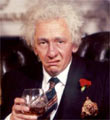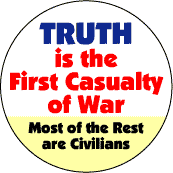a little about Bush...
II EARLY LIFE
Bush was born on July 6, 1946, in New Haven, Connecticut, the first child of George Herbert Walker Bush and Barbara Pierce Bush. His grandfather, Prescott Bush, was a Wall Street financier who was elected to the Senate of the United States from Connecticut in 1952. Although George Herbert Walker Bush began his career in the oil industry, he eventually served as a congressman, head of the Republican National Committee, ambassador to the United Nations, director of the Central Intelligence Agency (CIA), and vice president and president of the United States.
At the age of two, Bush moved with his parents from Connecticut to Odessa, Texas, where his father embarked on a career in the petroleum business. After a year in Texas, the family relocated to California for business reasons. A year later, the family moved back to Texas and settled in Midland, a town in western Texas located about 500 km (300 mi) from Fort Worth. Bush lived in Midland from 1950 to 1959. In 1953 his younger sister Robin, the next oldest child in the family, died from leukemia. After her death, Bush grew especially close to his mother. He had four other siblings: brothers Jeb, Neil, and Marvin, and a sister, Dorothy. In 1959, again for business reasons, the family moved to Houston, Texas. In 1961 Bush left Texas and went to Andover, Massachusetts, to attend Phillips Academy, a boarding school that his father had also attended.
At Phillips, Bush played basketball, baseball, and football. He was best known for being head cheerleader and commissioner of an intramural stickball league. In 1964 he enrolled at Yale University in Connecticut; his father and grandfather had also attended Yale. That same year, Bush campaigned for his father in his unsuccessful bid to win a U.S. Senate seat from Texas.
At Yale, Bush was considered an average student, but he was popular with his classmates. He was head of the Delta Kappa Epsilon fraternity and a member of the exclusive Skull and Bones, a secret society that his father and grandfather had also joined. During Bush’s time at Yale, college students all over the country began to hold protests about a variety of issues, including protests against U.S. involvement in the Vietnam War (1959-1975). Bush was uncomfortable with the growth of the student protest movement, and he generally refrained from participating in campus politics. In 1968 he campaigned on behalf of his father, who was running for reelection for a seat in the House of Representatives that he had won in 1966.
Bush graduated from Yale with a bachelor’s degree in history in 1968. Upon completing college, he became eligible for the military draft. To meet his service obligation, Bush enlisted in the Texas Air National Guard in 1968. He told the admitting officer that he wanted to become a pilot like his father, who was a highly decorated Navy flier in World War II (1939-1945). He did his basic training at Lackland Air Force Base in San Antonio, Texas, and entered a pilot-training program at Moody Air Force Base in Valdosta, Georgia. He received favorable reports from his superiors, attained the rank of second lieutenant, and was certified to fly the F-102 jet fighter during training missions in the South and along the Gulf Coast. Bush remained in the Air National Guard until 1973.
During the early 1970s, Bush worked on U.S. Senate campaigns for Republican candidates in Florida and Alabama. He also worked for a Houston-based firm that specialized in large-scale agricultural operations. In addition, Bush was involved in a mentoring program for children in inner-city Houston. During this time, he flirted with the idea of running for state representative in Texas but decided against it. In 1973 he was admitted to Harvard Business School in Massachusetts.
III EARLY CAREER
Bush Discusses the Texas Rangers In 1989 George W. Bush purchased a small share of the Texas Rangers, a professional baseball team. He became one of the managing general partners of the team and served as its public spokesperson. The position increased Bush’s exposure in Texas.AP/Wide World Photos
After earning his M.B.A. from Harvard in 1975, Bush returned to Midland. Like his father, he first entered the oil industry as a “landman,” someone who helps organize oil-drilling ventures by bringing together geologists, property owners, and investors. In this position, Bush searched property records, studied geological reports, and negotiated deals.
In 1977 Bush announced that he was running for a seat in the U.S. House of Representatives. Shortly after he declared his candidacy, he met Laura Welch, a Midland native who worked as a librarian and an elementary-school teacher. In November 1977, three months after they met, the couple wed. Bush became the Republican congressional candidate after a tough primary race, but he lost the general election in 1978. His Democratic opponent attacked Bush as an outsider and a newcomer who did not understand the needs of voters in Texas. Bush captured the financial and political support of the oil industry, but his opponent won the support of rural and agricultural voters.
After his loss, Bush resumed his career in the oil industry, starting a series of small, independent oil-exploration companies, including Arbusto Energy Inc. (Arbusto is the Spanish word for “bush.”) In 1980 he again campaigned on behalf of his father, who had been chosen as the vice-presidential running mate of Ronald Reagan. (Reagan won the election, and Bush’s father went on to serve two terms as vice president.) In 1981 Bush and his wife became the parents of twin daughters, Jenna and Barbara, who were named for their grandmothers. Although he was raised as an Episcopalian, Bush began worshiping as a Methodist, the denomination of his wife.
Bush’s oil companies never enjoyed great success. He changed the name of Arbusto Energy to Bush Exploration and spent time in New York attracting investors. In 1984, however, his company merged with a larger company, Spectrum 7. Bush became chairman of Spectrum 7, but the company was hurt by falling oil prices. In 1986 it was folded into Harken Energy Corporation, another Texas petroleum company. Bush served as a consultant and a member of Harken’s board of directors.
In 1987 Bush relocated his family to Washington, D.C., to assist his father in his bid to become president. He worked as a campaign adviser at his father’s national campaign headquarters, serving as a liaison to the media and to conservative and Christian leaders. He was a trusted confidant of his father and mother, who sometimes dispatched Bush to measure the loyalty of certain campaign aides and members of the vice president’s staff. He also campaigned across the country, sometimes appearing as a surrogate for his father. After his father won the election, Bush served as an adviser to the president-elect. He helped oversee a group that decided which individuals might be offered posts in the Bush administration.
After the election, Bush moved to Dallas, Texas, and purchased a small interest in the Texas Rangers baseball team in 1989. He became one of the managing general partners of the baseball team and agreed to serve as the public spokesperson for the ownership group. Bush’s affiliation with the team raised his profile in Texas. In 1990 he explored, but then abandoned, the idea of a bid for the Texas governor’s office. During his time with the Rangers, he oversaw the building of a new baseball stadium in Arlington, Texas. Bush, a lifelong baseball fan, was extremely happy during his tenure with the team.
During the early 1990s, Bush repeatedly traveled to Washington, D.C., to confer with his father—the president—and to offer his advice. They discussed various members of the elder Bush’s White House staff. During his father’s time in the White House, Bush was the subject of a Security and Exchange Commission (SEC) inquiry. The SEC investigated whether Bush had engaged in insider trading when he sold Harken Energy stock shortly before Harken announced financial losses. The investigation ended with no proof of wrongdoing. In the 1992 presidential race, Bush again campaigned on behalf of his father; the elder Bush lost the election to Democrat Bill Clinton. After his father’s defeat, Bush turned his attention to his own political ambitions in Texas and began a regular series of meetings with advisers in Dallas to plan a run for the office of governor.
© 1993-2003 Microsoft Corporation. All rights reserved.







 Reply With Quote
Reply With Quote









Bookmarks